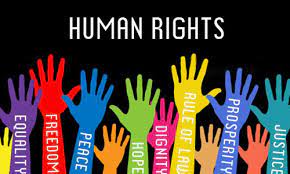Introduction:
Human rights are fundamental rights and freedoms that every individual is entitled to, regardless of their nationality, race, religion, or gender. In the United States, human rights are protected by a combination of federal and state laws, as well as constitutional provisions. This article explores the complexities of human rights law in the USA, examining its legal framework, key principles, challenges, and the ongoing efforts to ensure the protection and promotion of human rights.
I. Legal Framework for Human Rights in the USA:
A. Constitutional Protections:
The U.S. Constitution, particularly the Bill of Rights, guarantees certain fundamental rights, such as freedom of speech, religion, and the right to due process. These constitutional provisions form the foundation for human rights protection in the USA.
B. Federal Laws:
Several federal laws have been enacted to protect specific human rights, including the Civil Rights Act of 1964, the Americans with Disabilities Act (ADA), and the Equal Pay Act. These laws address discrimination, accessibility, and equal treatment in various areas of public and private life.
II. Key Principles of Human Rights Law:
A. Universality:
Human rights are considered universal, meaning they apply to all individuals regardless of their citizenship or residency status. This principle recognizes that all human beings possess inherent dignity and should be treated with equality and respect.
B. Non-Discrimination:
Human rights law prohibits discrimination based on characteristics such as race, color, gender, religion, national origin, disability, or sexual orientation. Equal protection and equal treatment are essential principles of human rights law.
C. Right to Life, Liberty, and Security:
The right to life, liberty, and security is a fundamental human right protected by law. It ensures that individuals are free from arbitrary arrest, detention, torture, or other forms of inhumane treatment.
III. Challenges and Areas of Focus:
A. Racial and Social Justice:
Addressing systemic racism and social injustice remains a significant challenge in the USA. The fight for racial equality, police reform, and the elimination of discriminatory practices are ongoing efforts to uphold human rights principles.
B. Gender Equality and Women’s Rights:
Promoting gender equality and protecting women’s rights are critical aspects of human rights law. Issues such as pay equity, reproductive rights, and combating gender-based violence continue to be areas of focus.
C. LGBTQ+ Rights: Advocacy for LGBTQ+ rights has gained significant momentum in recent years. Efforts to ensure equality, non-discrimination, and protection from hate crimes are essential for upholding human rights for all individuals.
IV. International Human Rights Standards:
A. Universal Declaration of Human Rights (UDHR):
The United States is a signatory to the UDHR, a landmark international document that sets out the fundamental rights and freedoms to which all individuals are entitled. The UDHR provides a framework for guiding human rights laws and policies globally.
B. International Human Rights Treaties:
The USA has ratified certain international human rights treaties, such as the International Covenant on Civil and Political Rights (ICCPR) and the Convention on the Elimination of All Forms of Discrimination Against Women (CEDAW). These treaties provide additional legal obligations and standards for human rights protection.
V. Enforcement and Remedies:
A. Legal Remedies:
Individuals whose human rights have been violated in the USA can seek legal remedies through various channels, including filing complaints with governmental bodies, pursuing civil lawsuits, or seeking redress through international human rights mechanisms.
B. Non-Governmental Organizations (NGOs):
NGOs play a crucial role in promoting and protecting human rights. They monitor human rights violations, advocate for policy changes, provide support to affected individuals, and engage in litigation to hold violators accountable.
VI. Balancing Human Rights and National Security
A. National Security Concerns:
Balancing human rights with national security concerns is a complex challenge. In the USA, issues such as surveillance, counterterrorism measures, and immigration policies often intersect with human rights considerations. Striking the right balance between protecting individual rights and ensuring public safety is an ongoing debate.
B. Judicial Review:
The role of the judiciary is crucial in interpreting and applying human rights laws. Courts play a vital role in safeguarding individual rights, reviewing the constitutionality of laws and government actions, and holding public authorities accountable for human rights violations.
VII. Evolving Nature of Human Rights:
A. Emerging Issues:
As society evolves, new challenges arise that require an expansion of human rights protections. Technological advancements, privacy rights in the digital age, climate change, and economic inequality are some of the emerging issues that demand attention within the framework of human rights law.
B. Intersectionality:
Recognizing the intersectionality of human rights is vital. Human rights cannot be addressed in isolation, as individuals often face multiple forms of discrimination and marginalization. Considering the interconnectedness of rights and addressing the unique experiences of marginalized groups is essential for effective human rights protection.
VIII. Advocacy and the Role of Civil Society:
A. Public Awareness and Education:
Raising public awareness about human rights issues is crucial for fostering a culture of respect and accountability. Education and advocacy efforts play a significant role in promoting human rights values and mobilizing support for meaningful change.
B. Grassroots Movements:
Grassroots movements and civil society organizations are at the forefront of human rights advocacy. Through activism, protests, and community engagement, these groups raise awareness, amplify marginalized voices, and push for policy reforms that protect and promote human rights.
Conclusion:
Human rights law in the USA is a complex and evolving field that seeks to protect and promote the fundamental rights and freedoms of all individuals. It is grounded in constitutional provisions, federal laws, international treaties, and the tireless efforts of activists and civil society organizations. While significant progress has been made in advancing human rights, challenges persist, requiring ongoing commitment to addressing systemic discrimination, promoting equality, and striking the right balance between rights and national security. By understanding the complexities of human rights law and actively engaging in advocacy and reform efforts, individuals and society as a whole can contribute to the ongoing journey towards a more just and rights-respecting nation.


